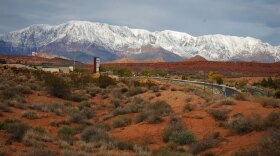-
As the climate warms, winter snow is less of a given. And the Olympics might have to come up with creative solutions. One idea that's getting a serious look? A rotating list of host sites.
-
Utah’s statewide snowpack level has reached a record low. Much of the West is in the grip of a snow drought, impacting everything from water supplies to mountain forests.
-
Record 2025 temperatures show how climate change is affecting Utah, including the state’s water supply.
-
There’s been a noticeable lack of snow in northern Utah to start the winter season. But in the short term, Utah’s wildlife is taking advantage of the milder temperatures.
-
“We're closer to the edge of the cliff than we realize,” said one Colorado River expert who worked on a new report outlining what 2026 could hold for Utah’s Lake Powell.
-
Northern Utah has a small fraction of the snowpack it typically has this time of year. That’s bad news for ski season and water supplies.
-
October set the stage for Utah to have a solid spring snowmelt runoff. That is, if the state can catch enough snow this winter.
-
Since 2000, heat has become the primary force behind how severe and widespread Western droughts get.
-
Todo lo que ganó el Gran Lago Salado durante el invierno probablemente se disipará para finales del verano. El comisionado del Great Salt Lake, Brian Steed, insta a los habitantes de Utah a ser conscientes del uso que hacen del agua.
-
All of the gains the Great Salt Lake made over the winter will likely dissipate by the end of summer. Great Salt Lake Commissioner Brian Steed urges Utahns to be mindful of their water usage.
-
The mountains that feed the Colorado River with snowmelt are strikingly dry. Many ranges are less than 50% of their average snow for this time of year.
-
Utah’s drought conditions could deteriorate even more as temperatures start to climb. NOAA’s latest seasonal outlook expects above-average heat through July.
Play Live Radio
Next Up:
0:00
0:00
Available On Air Stations











